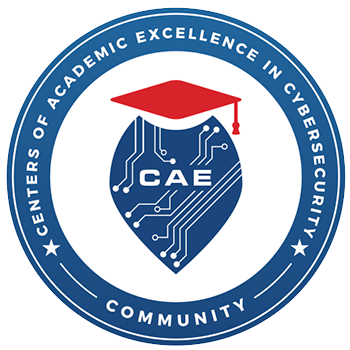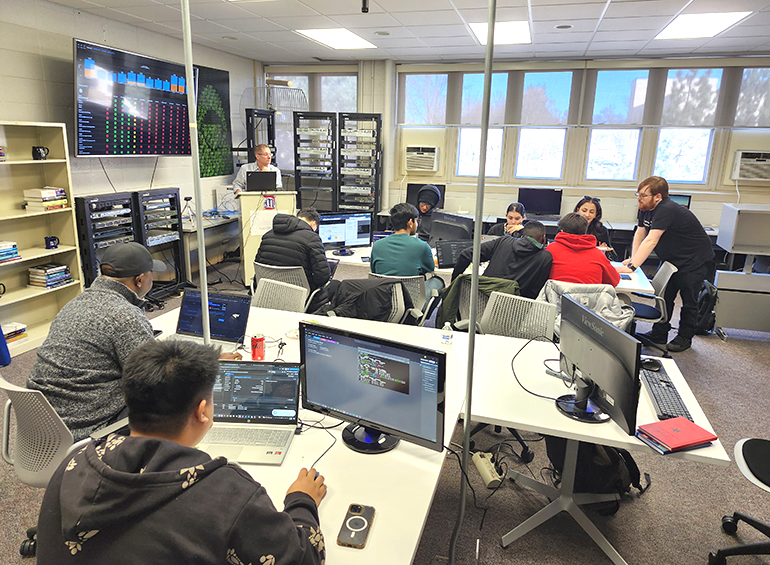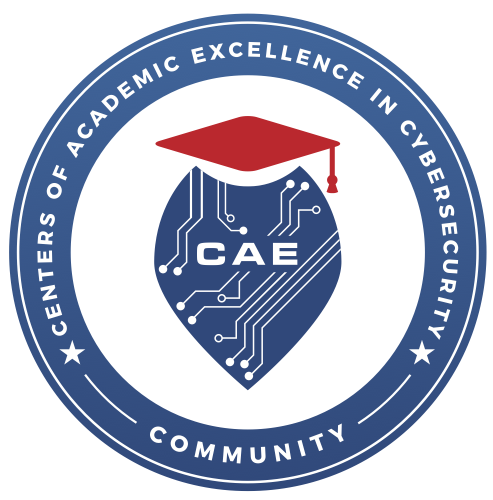Cybersecurity & Information Systems
Your Career in Cybersecurity Starts at Detroit Mercy
Organizations need skilled professionals with technical and managerial skills to protect and defend against cyberattacks.
Our Bachelor of Science in Cybersecurity prepares students using hands-on learning to obtain the technical knowledge and competencies to build, protect, and defend organizational assets.
Our Master of Science in Cybersecurity Management focuses on risk management, data governance, threat intelligence, and cyber operations defense to prepare students to lead the charge in minimizing the business impact of a cyberattack. Upon completion of the program, you will be prepared for careers in managing and governing cybersecurity in information systems and organizations.
Our Master of Science in Information Technology was designed on the belief that IT is at the core of every business and that successful businesses require IT leaders who possess a strong understanding of both technology and essential business management principles. With this in mind, the program has five core courses focused on technical basics and five electives that allow you to choose what area interests you most such as data analytics, cybersecurity, or business intelligence.
Our Cybersecurity programs have been validated by the National Security Agency’s Center of Academic Excellence in Cyber Defense
The National Security Agency (NSA) and its affiliated federal agencies have designated UDM as a National Center of Academic Excellence in Cybersecurity Cyber Defense.


See also our Center for Cybersecurity & Intelligence Studies
Undergraduate Programs
-
Bachelor of Science in Cybersecurity
Get your Bachelor of Science in Cybersecurity
Great Job Outlook!
- The Bureau of Labor Statistics predicts a 33% increase in the demand for information security analysts between 2023 and 2033—an increase of 47,100 jobs.
- According to Cybersecurity Magazine, the number of unfilled cybersecurity jobs grew by 350 percent, from one million positions in 2013 to 3.5 million in 2021.


University of Detroit Mercy is designated by the National Security Agency as a Center for Academic Excellence in Cyber Defense from 2004 to present.
Requirements for the Major (48 credits)
To obtain this undergraduate degree, the student must fulfill the requirements of the University Core Curriculum, the requirements for the program major and complete a minimum of 120 credit hours.
Download Sample Curriculum (pdf) ▶
Required Courses (42 credits):
- CIS 1010 Foundations of Cybersecurity (3 credits)
- CIS 2570 Network Engineering Fundamentals (3 credits)
- CIS 3070 Software Testing and Quality Assurance (3 credits)
- CIS 3350 Introduction to Human Factors in IT Security (3 credits)
- CIS 3720 Incident Response and Disaster Recovery (3 credits)
- CIS 3850 Cybersecurity Risk Management (3 credits)
- CIS 4060 Systems Analysis and Design (3 credits)
- CIS 4075 Enterprise Architecture (3 credits)
- CIS 4450 Introduction to Digital Forensics (3 credits)
- CIS 4505 Software Project Management (3 credits)
- CIS 4560 Database Design (3 credits)
- CIS 4650 Information and Society (3 credits)
- CIS 4710 Ethical Hacking (3 credits)
- ENL 3030 Technical Writing (3 credits)
Plus Two Electives (6 credits):
- Any CIS classes not listed in the major (3 credits)
- BUS 3170 Management of Information Systems (3 credits)
- CSSE 1710 Introduction to Programming I (3 credits)
- CSSE 2130 Java (3 credits)
- CSSE 4440 Web Technology (3 credits)
Program Level Learning Outcomes for the Bachelor's Program
The program enables students to attain the following by the time of graduation:
- Analyze a problem and identify and define the security risks and requirements appropriate to its solution.
- Demonstrate the use of techniques, skills and tools necessary for cyber defense within an organization.
- An understanding of professional, ethical, legal, security and social issues and responsibilities related to computing.
- Function effectively on teams to accomplish a common goal.
Ready for the next step? VISIT | APPLY
-
Accelerated 5-Year Bachelor's to Master's Programs
Where could you be in five years?
For ambitious, driven and career-minded incoming freshmen, University of Detroit Mercy offers two options to increase your knowledge and skills as a full-time student for 10 semesters (5 academic years) before entering the workforce:
5-Year Accelerated Cybersecurity bachelor's to master's curriculum and course information
- Bachelor of Science in Cybersecurity; Master of Science in Cybersecurity Management
- Bachelor of Science in Cybersecurity; Master of Science in Intelligence Analysis
In order to complete both the bachelor's and master's degrees in five years, you must:
- Be very well prepared as an incoming freshman or transfer student;
- Satisfy all the admission criteria (see below); and
- Maintain a cumulative 3.25 GPA at Detroit Mercy, in order to take graduate-level courses while still an undergraduate.
This program allows incoming freshmen to complete both the bachelor's and master's degrees by being a full-time student for 5 academic years (10 consecutive semesters). Juniors at Detroit Mercy may be admitted into the program with the permission of the department and Dean’s Office.
Requirements for Transfer Students
Students transferring in from a community college require permission from the Dean's Office.
In order to complete the bachelor's and master's degrees entering as a transfer student you must:
- Have 60-63 transferable credits.
- Meet the requirements for the Michigan Transfer Agreement (MTA).
- Maintain a cumulative GPA of 3.25 throughout the entire undergraduate portion of the program, and a minimum GPA of 3.0 for graduate courses.
- Maintain full-time status. This is typically 15-18 credit hours per semester, for a total of 102-108 credits for students entering as a senior.
- Finish the bachelor's degree by the end of the fourth year and master's degree by the end of the fifth year. During your senior year, you can take up to two graduate level courses for each term with a maximum of four.
- Students can take summer courses if needed to catch up or advance.
- Students are not required to apply for the graduate portion or take any exams such as GRE if they have met and maintained all accelerated program requirements.
Sample Program for Incoming Freshmen
(Note: Full-time status must be maintained in all semesters)
First Year: 30-36 undergraduate credits
Second Year: 30-36 undergraduate credits
Third Year: 30-36 undergraduate credits
Fourth Year:- First Semester: 9-12 undergraduate credits, 6 graduate credits
- Second Semester: 9-12 undergraduate credits, 6 graduate credits
- First Semester: 6-12 graduate credits (depending on program)
- Second Semester: 6-12 graduate credits (depending on program)
Sample Program for Transfer Students
(Note: Full-time status must be maintained in all semesters)
Third Year: 30-36 undergraduate credits
Fourth Year:- First Semester: 9-12 undergraduate credits (6 graduate credits)
- Second Semester: 9-12 undergraduate credits (6 graduate credits)
Fifth Year:
- First Semester: 6-12 graduate credits (depending on program)
- Second Semester: 6-12 graduate credits (depending on program)
-
Minor - Cybersecurity
University of Detroit Mercy's 18-credit minor in cybersecurity is designed to provide you with a foundation in database, networking and cybersecurity principles. This minor focuses on theoretical principles rather than on specific software or particular network components. Topics covered include network security, software security and information security. This minor is a strong addition to many majors including criminal justice, health information management, nursing, digital media and education.
Graduate Programs
-
Master of Science in Cybersecurity Management
Get your Master of Science in Cybersecurity Management
University of Detroit Mercy's Master of Science in Cybersecurity Management will provide you with comprehensive knowledge of the field. You will learn all of the basic cybersecurity principles, technologies and processes in the required core, and then take two elective classes tailored to your interests. These elective classes are designed to prepare you to step into specific roles in the cybersecurity workforce and are aligned with the National Cybersecurity Workforce Framework (NICE 2.0).

The University is recognized by the National Security Agency and the U.S. Department of Homeland Security as a Center for Academic Excellence in Cyber Defense.
Degree Requirements (30 credits)
A student must complete 30 credit hours, which is comprised of eight core courses and two electives.
Eight Core Courses (24 credits)
- CYBE 5700 Principles of Cybersecurity (3 credits)
- CYBE 5730 Cyberlaw (3 credits)
- CYBE 5740 Secure Acquisition (3 credits)
- CYBE 5750 Cybersecurity Technologies (3 credits)
- CYBE 5770 Cyber Defense Operations (3 credits)
- CYBE 5780 Risk Management Processes (3 credits)
- CYBE 5790 Cybersecurity Control Processes (3 credits)
- CYBE 5910 Information Audit (3 credits)
Electives (Choose two - 6 credits)
- CYBE 5200 Specification (3 credits)
- CYBE 5300 Software Assurance (3 credits)
- CYBE 5580 System Forensics (3 credits)
- CYBE 5710 Ethical Hacking (3 credits)
- CYBE 5760 Automotive Cyber Security Management Systems (3 credits)
- CYBE 5800 Special Topics in Cybersecurity (3 credits)
Program-Level Outcomes for the Master of Science in Cybersecurity Management
The program enables students to attain the following by the time of graduation:
- Demonstrate an understanding of the fundamental concepts, technologies, and challenges of ensuring network security.
- Make informed judgments in computing practice based on legal and ethical principles.
- Demonstrate an understanding of the key concepts of information security governance and risk management to include best practices in disaster recovery planning and business continuity.
- Analyze and evaluate systems with respect to maintaining operations in the presence of risks and threats.
- Apply security principles and practices to the organizational environment, hardware, software, and human aspects of a system.
Ready for the next step? INQUIRE | VISIT | APPLY
-
Master of Science in Information Technology
Get your Master of Science in Information Technology
Gain a Competitive Edge in a Digital, Global World
University of Detroit Mercy's Master of Science in Information Technology is an opportunity for you to advance your career as an information technology leader. The curriculum incorporates comprehensive professional knowledge and best practices with regard to IT work.
Degree Requirements (30 Credits)
Students must complete 30 credit hours, which are comprised of five core courses and five electives.
Program Required (15 credits)
- CIS 5010 Introduction to Information Systems (3 credits)
- CIS 5075 Enterprise Architecture (3 credits)
- CIS 5200 Systems Analysis and Design (3 credits)
- CIS 5300 Software Assurance (3 credits)
- CIS 5400 Software Management (3 credits)
Program Electives - Choose five from the list below (15 credits)
- Any CIS graduate-level course not listed above (3 credits)
- Any CYBE graduate-level course (with approval from the department chair) (3 credits)
- DATA 5001 Science and Data (3 credits)
- DATA 5150 Quantitative Foundations of Economic Analysis (3 credits)
- DATA 5310 Introduction to Data Mining (3 credits)
- MBA 5200 Modeling, Analytics, and Operations Decisions (3 credits)
- MBA 5260 Systems and Technology (3 credits)
- MBA 5335 Business Intelligence (3 credits)
MSIT Program Learning Outcomes:
- Apply knowledge of computing to produce effective designs and solutions for specific problems.
- Demonstrate the use of techniques, skills, and tools necessary for the effective management of IT systems in a complex environment.
- Understand the professional, ethical, legal, security and social issues related to computing and how to incorporate them into the business and IT architecture of an organization.
- Demonstrate leadership and ability to function effectively on cross disciplinary teams to accomplish a common goal.
Admission Requirements
The Master of Science in Information Technology is open to students of high academic promise who have earned a four-year baccalaureate degree from an accredited college or university. Of primary importance are the nature and quality of the applicant's prior academic record and work experience. No prior work in software management is necessary since the curriculum encapsulates the entire body of knowledge.
Admission Materials
Applicants should apply online and submit the following materials:
- Official transcripts for all previous academic work; and
- Any other information that the applicant feels is important to the admission decision.
STEM/OPT Program – International Students
Detroit Mercy's Master of Science in Information Technology is a qualified STEM program by the U.S. Department of Homeland Security.
Ready for the next step? INQUIRE | VISIT | APPLY
-
Dual Degree: MBA/MS in Information Technology
Dual Degree: Master of Business Administration and Master of Science in Information Technology
University of Detroit Mercy offers a dual degree option where students can earn a Master of Science in Information Technology and a Master of Business Administration. This degree option is designed to help business professionals expand their knowledge of the business environment along with the rapidly changing world of information technology. The dual degree option is not available as an online course of study.
-
Graduate Certificate in Vehicle Cyber Technology
This 15-credit certificate will provide comprehensive training in the area of vehicle cybersecurity.
You will develop knowledge and skills in
- security policy and infrastructure development (governance),
- risk understanding and threat response (TARA),
- cyber defense processes and techniques (ethical hacking),
- networking and embedded system management (secure software assurance).
Some previous knowledge of computing and research methods will be advantageous for students. However, the graduate certificate is structured in a way that minimal knowledge of these areas is needed to be successful.
Prepares you for the vital industry need for vehicle cyberdefense as well as the impending UNECE regulations
You'll learn technical skills for vehicle threat and risk management and operate in the big picture of international regulation, which is a critical area of need in the current industry.
An interdisciplinary certificate program
The certificate is administered by the Department of Cybersecurity & Information Systems, with courses coming from our Master’s Degree in Cybersecurity Management — which is an NSA Center of Academic Excellence validated curriculum in Cyber Defense (CAE-CD) — as well as Detroit Mercy’s highly regarded College of Engineering & Science. The courses are developed and taught by faculty with specific expertise in accordance with their research interest.
 Coming to Detroit Mercy was one of the best decisions I've made thus far. Everyone I come across from students to professors on campus have done nothing but reassure my success. One thing Detroit Mercy has that makes me happy is resources. With resources comes the ability to learn more than you thought you could.
Coming to Detroit Mercy was one of the best decisions I've made thus far. Everyone I come across from students to professors on campus have done nothing but reassure my success. One thing Detroit Mercy has that makes me happy is resources. With resources comes the ability to learn more than you thought you could.
— Daniel Okunawo
Cybersecurity Jobs are in High Demand
$76K
IT Auditors generally earn $76K with one to three years of experience
17% / 33%
2023-33 Job Growth Outlook is much faster than average for Computer and Information Systems Mangers (17%) as well as Information Security Analysts (33%).
$120K
2023 Median nation-wide Pay for Information Security Analysts is about $120K annually.
—U.S. Bureau of Labor Statistics
Detroit Mercy Cybersecurity Club
Whether you are just a little bit curious or have more direct experience with cybersecurity, our student-run organization will expand your knowledge through peer discussions, hands-on activities and expert presentations.
To join or learn more contact:
Gregory Laidlaw, DMIT, CISSP
laidlags@udmercy.edu
- Visit our Cybersecurity Club page
- Join our LinkedIn Group
 For my cybersecurity career, my M.S. degree from Detroit Mercy provided the academic mortar to the raw foundation of work experience. Every class provided new 'ah ha' moments and shed light on how to improve program effectiveness. Today I'm the head of the cybersecurity and privacy program for my organization.
For my cybersecurity career, my M.S. degree from Detroit Mercy provided the academic mortar to the raw foundation of work experience. Every class provided new 'ah ha' moments and shed light on how to improve program effectiveness. Today I'm the head of the cybersecurity and privacy program for my organization.
— Lucas Otten '19
Chief Information Security Officer for Munson Healthcare;
previously Manager of Information Systems

